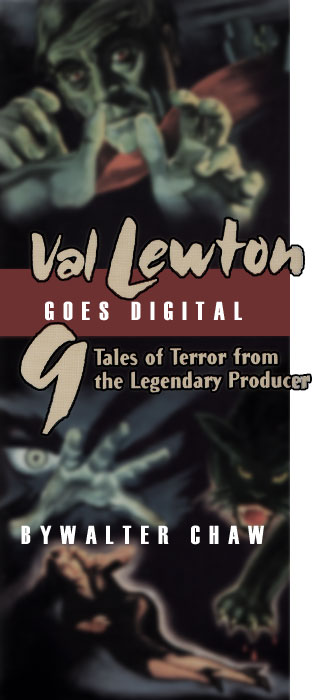 CAT PEOPLE (1943)
CAT PEOPLE (1943)
****/**** Image B Sound C+
starring Simone Simon, Kent Smith, Tom Conway, Jane Randolph
screenplay by DeWitt Bodeen
directed by Jacques Tourneur
THE CURSE OF THE CAT PEOPLE (1944)
****/**** Image B+ Sound B
starring Simone Simon, Kent Smith, Tom Conway, Jane Randolph, Ann Carter
screenplay by DeWitt Bodeen
directed by Gunther V. Fritsch and Robert Wise
I WALKED WITH A ZOMBIE (1943)
****/**** Image C Sound B-
starring James Ellison, Frances Dee, Tom Conway
screenplay by Curt Siodmak and Ardel Wray
directed by Jacques Tourneur
THE LEOPARD MAN (1943)
***½/**** Image C- Sound B-
starring Dennis O’Keefe, Margo, Jean Brooks, Isabel Jewell
screenplay by Ardel Wray, based on the novel Black Alibi by Cornell Woolrich
directed by Jacques Tourneur
THE SEVENTH VICTIM (1943)
****/**** Image C+ Sound C
starring Tom Conway, Jean Brooks, Isabel Jewell, Kim Hunter
screenplay by Charles O’Neal and DeWitt Bodeen
directed by Mark Robson
THE GHOST SHIP (1943)
***½/**** Image A- Sound B
starring Richard Dix, Russell Wade, Edith Barrett, Ben Bard
screenplay by Donald Henderson Clarke
directed by Mark Robson
THE BODY SNATCHER (1945)
***½/**** Image C- Sound C+
starring Boris Karloff, Bela Lugosi, Henry Daniell, Edith Atwater
screenplay by Phillip MacDonald and Carlos Keith
directed by Robert Wise
ISLE OF THE DEAD (1945)
*/**** Image B- Sound B-
starring Boris Karloff, Ellen Drew, Marc Cramer
screenplay by Ardel Wray & Josef Mischel
directed by Mark Robson
BEDLAM (1946)
*½/**** Image B- Sound B-
starring Boris Karloff, Anna Lee, Billy House, Richard Fraser
screenplay by Carlos Keith and Mark Robson
directed by Mark Robson
VAL LEWTON: THE MAN IN THE SHADOWS (2007)
**½/**** Image N/A Sound N/A
directed by Mark Robson
by Walter Chaw SPOILER WARNINGS IN EFFECT. It’s not too much to speak of Val Lewton as the American Jean Cocteau. An enigmatic figure with his hand, like Cocteau, in more than one media (a novelist, he often did uncredited work on the screenplays for his films), the movies produced under his RKO watch are a repository of dream sleep, enough so that an overview of his key pictures–something made possible by Warner’s rapturous DVD collection of his horror fare–uncovers a treasure trove of indelible nightmare images. Where Cocteau affected a studiedly casual mien and came to film in his sixties, however, Lewton (who died at 47) seems the product of financial expediency and, perhaps more impressively, stamped the products of his hand despite roadblocks placed in his way. Yet the similarities are striking: Above and beyond the dreamscapes affected, there’s a common fascination with masks and false identities; an obsession with budding sexuality turned subtly aberrant; and a cycle of seduction tied to corruption in the move from innocence to experience. I see in these recurrent themes a man fascinated by the blinds that men throw before them to deny the unknowable tides governing their emotions and actions. It’s that illusion of civilization that informs Lewton’s pictures; the horror of them is in the ripping away to expose the insect underneath.

 A Gun to the Head (d. Blaine Thurier)
A Gun to the Head (d. Blaine Thurier)